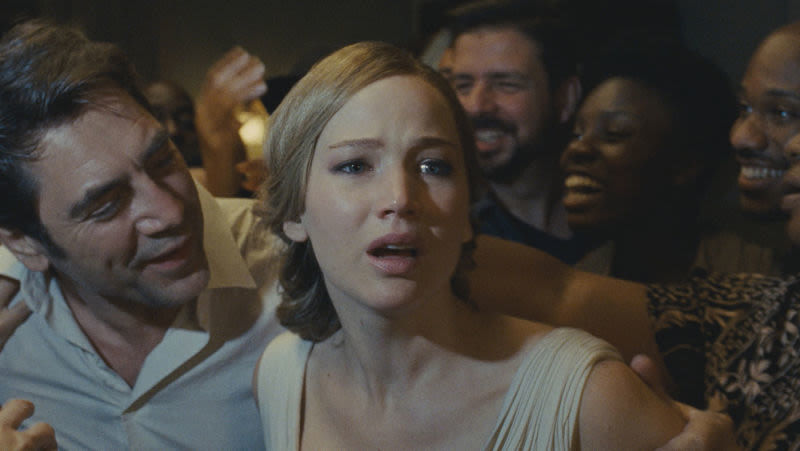
It’s fair to say that Darren Aronofsky’s mother! is the mother of all allegorical films.
Everyone can agree that it’s an allegory of something, but specifically what? Is it an allegory for the insatiable selfishness and neediness of the artist? Is it a new take on Sartre’s “hell is other people”? Is it a Biblical allegory about the impossibility of maintaining Eden? Is it a cautionary tale about the dangers of going off your meds? Or is it an anti-fundamentalist treatise about the secret gnarliness of the Bible, a kind of “how you like your literal interpretation of the Bible now”?
Talk to 100 different people and you’re likely to get 100 different interpretations, although I can basically say yes to some version of all of the above.
Our heroine is Mother (Jennifer Lawrence, giving good struggle face), who has possibly been created, fully formed from her husband’s mysterious crystal. Or maybe she was there the whole time—who can say?
The husband, played by Javier Bardem in all his earthy, alpha-male largeness, is a once-successful poet who is now experiencing writers’ block. A while back, his isolated mansion burned down—he retrieved that mysterious crystal from its embers—and he and his much younger wife have rebuilt it. Specifically, she has rebuilt it—painting, cleaning, and tending lovingly to every room; breathing it, he says, with new life.
Mother is content to be the ur-homemaker and, eventually she hopes, a real mother, but her husband is restless. He wants to create and then to bask in the adoration that comes from his creation. Then one night there’s a knock on the door. It’s a man (Ed Harris) who says he mistook the large house for a bed and breakfast. The husband invites him in. Eventually, we find out two things about the guest—he’s dying of cancer and he didn’t stumble across the house by accident; he wanted to meet the poet who changed his life before he died. Later, the man’s wife (Michelle Pfeiffer) shows up. She’s nosy and imperious and makes herself at home. All the while, Mother resents the interlopers; she wants them to go away, to return to her Eden. More people come—the guests’ two large adult sons, who are feuding over a will. A fight breaks out. One of the sons dies.
I should mention that all of this is played occasionally for laughs—Harris and Pfeiffer deliver delightfully outsized performances—but also for horror. The house is creepy and the walls seem to sometimes breathe and bleed, like a more polite (at first at least) version of del Toro’s gothic mansion in Crimson Peak. But every time the house freaks Mother out, she takes her medicine—an amber powder she stirs into water—and things are okay for a while.
Finally, the guests leave. Mother and her husband have sex—he had been having difficulty in that department—and she becomes pregnant. She spills out her meds. The husband begins to write, feverishly. The thrill of his restored virility—not to mention the boost he got from basking in the adoration of his house guests—has inspired him. The resulting poem is a masterpiece and is published right around the time that Mother is about to give birth.
And now we enter the third act of the film, which is, to put it mildly, completely off the rails. I won’t say much, except that more people show up and then more and more—and our Eden eventually turns into a literal hell. In a way, the abject insanity of the third act was inevitable in light of everything that had come before it, but I confess that I preferred mother! when it was slow-burn crazy, not a relentless orgy of WTF.
Still, mother! is a film that demands to be seen and reckoned with. Will you love it? Will you hate it? Will you love it a little and hate it a little—as I did? Which of its grab bag of allegories will resonate most with you?
Just remember as you’re watching it: Don’t get overly disturbed by its (very disturbing!) goings on. This is most definitely not real life.
